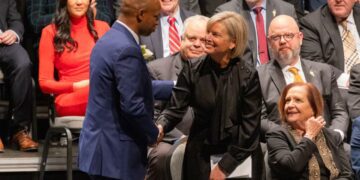SPRINGFIELD – Monday at 5:00 PM, the deadline for candidate petitions to be on the June 28th, 2022 Democrat and Republican primary ballots will mark the petition signature gathering phase of the 2022 election as history. The next phase, submitting objections to about petition signatures, their quality and their legality, will commence.
Many a candidate has been tossed from the ballot after objections by their opponents or challengers showed the candidates, indeed, were not qualified to be on the ballot because of faulty petition signatures.
This next phase is a crucial one – and one that can, if the election law is ignored, land a person involved in petition-gathering in jail, or on probation with mandated community service.
That is what happened with Illinois Republican consultant Rod McCulloch in 2005.
Accusations of forging signatures, lying about how he obtained the signatures and who actually gathered the signatures – as asked on the petition sheets – ran McCulloch into legal trouble.
Illinois ballot petition sheets include a certification section under which the person submitting the petitions swears that the signatures were signed in his or her presence and are genuine. (See 10 ILCS 5/10-4 (West 2004)). Those sheets are then submitted to a notary public for certification before being turned into the State or County Board of Elections.
In McCulloch's case, Melissa Piwowar, a notary and paralegal, testified that she was responsible for notarizing the petition sheets McCulloch was handling.
She stated that, as FindLaw writes,
when McCulloch gave her his petitions [to be certified], she complimented his ability to obtain so many signatures during inclement weather. McCulloch told her that he recruited a team of people to collect signatures and that he would park at the end of a street while they walked up and down it. Piwowar then immediately expressed concern about notarizing the petitions if McCulloch had not personally collected the signatures. Piwowar said that McCulloch then told her that he was standing next to the crew members collecting the signatures and that, although a person on his team might have been holding the clipboard, he was there. Piwowar then notarized the petitions.
In the 2005 bench trial, then-DuPage County Judge Michael Burke found McCulloch guilty of perjury, saying that if the crew McCulloch said gathered the signatures committed the forgeries without his knowledge because he was not supervising them well, he could not also maintain that he saw the signatures being made and thus should not have signed off on their validity.
So in order to sign a petition as a circulator, that person has to say that they saw the petition being signed and that the person signing the petition was indeed the person that signed their signature.
FindLaw writes,
McCulloch testified that he signed the petition sheets and that “each and every signature to the best of my belief was signed in my presence.” He said that he believed the attestations that he signed were true and that he did not believe that any of his crew falsified signatures. Gumm's campaign paid him, and he then paid the crew. McCulloch stated that it later came to his attention that the signatures had been challenged. He did not attempt to locate the crew at that time, but his attorney later tried to find them without success.
McCulloch was paid $1.50 per signature. This election, the going rate per signature was $8.00.









